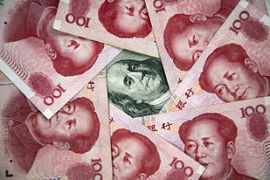China plans Argentina currency swap
Proposed deal marks Beijing’s latest move to reduce relliance on US dollar.

The agreement emphasises China’s anxiety about the dollar’s health and comes in advance of this week’s G20 summit in London, where Beijing is expected to press for a bigger role in managing global finances.
Currency exchange
The agreement, announced by Zhou Xiaochuan, the governor of the People’s Bank of China, at the Inter-American Development Bank meeting in Colombia, calls for China and Argentina to exchange 70 billion yuan ($10bn), of their currencies for use in trade and investment.
The deal would eliminate the need for each other’s companies to buy dollars to pay for transactions, but with few details available, it was unclear how and when Argentinian companies might get the yuan.
The yuan does not trade on world markets and China has yet to relax barriers that prevent its cross-border use.
While Beijing has said that Hong Kong, a Chinese territory with its own currency, will be allowed to use yuan for trade with the mainland, no time frame has yet been announced.
China, which holds the world’s largest foreign exchange reserves, valued at nearly $2 trillion over half of which is thought to be denominated in dollars, has signed a string of agreements in recent months promising to lend yuan to South Korea, Malaysia, Indonesia and Belarus if needed to respond to a financial emergency.
Dollar fears
In recent weeks, Zhou has called for the establishment of a new currency reserve system, to be controlled by the International Monetary Fund, saying such a system could prove more stable than the dollar.
The move, which echos earlier calls by Russia, indicates Chinese concern that the value of its huge foreign exchange reserves could significantly decline in value in the coming years.
|
“How can China protect its own interests in the current economic situation? You can’t change the US, so you can only change yourself” Zuo Xiaolei, |
But most analysts say that idea of an alternative reserve system is unlikely to take hold in the near future and the dollar is expected to dominate trade and central banks’ stores of foreign reserves for the foreseeable future.
Gradually expanding use of the yuan would be partly a defensive move by China, said Zuo Xiaolei, the chief economist for Galaxy Securities in Beijing.
“China is affected a lot when the dollar is up and down. Everyone is looking for balance and self-protection,” she said.
“How can China protect its own interests in the current economic situation? You can’t change the US, so you can only change yourself.”
Chinese companies have had their profits squeezed by a 20 per cent rise in the yuan against the US currency since 2005, though that has stalled since September due to central bank intervention in the currency market to hold down export prices.